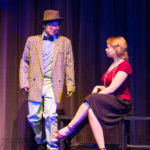Lawbreaking and summer projects – Mr. Johnson
Before I talk about summer projects and some of the excellent things you did and learnt about over the summer holidays, I want to tell you about something I learnt over the summer. Could you please raise your hand if you have used your iPad, smart phone or a computer at all this morning? You have all broken the law – and it’s not even 9 o’clock yet. Admittedly, in terms of law breaking, this is very much down there with placing a postage stamp upside down (Treason Felony Act 1848) or coming across a beached whale and not immediately offering it to the Queen as a gift (King’s Prerogative 1322) – but still. You have all been very naughty.
All this is because there are two ways of measuring time. The first is by looking at the sun; we have arbitrarily decided that when the sun is at its highest in the sky, we shall call this ‘noon’ and work everything else out from there. This is what Greenwich Mean Time is based upon. However, this causes problems, because the length of time it takes for the Earth to go round the sun is not constant. It changes a little each day, which means that gradually, over time, if all your seconds and minutes and hours are the same length, then noon will no longer be when the sun is highest. And so, UTC (coordinated universal time) was invented, which set out that there would be 86,400 seconds in a day and each second would be “the duration of 9,192,631,770 periods of the radiation corresponding to the transition between the two hyperfine levels of the ground state of the caesium-133 atom” (I don’t understand what I just said, either). The two different times – GMT and UTC – are always kept within 1 second of each other by the addition or subtraction of leap seconds to UTC as needed. This is what keeps the time matching the position of the sun, so that noon remains noon and doesn’t become the middle of the night. So why does this mean you have broken the law? Well, most electronical devices use UTC to tell the time – the fact that everything remains constant is hugely beneficial. However, UK law (the Interpretation Act of 1978, section 9 to be precise) decrees that the time in the UK is GMT. So, by a fraction of a second, by using your iPads, etc., you are all slightly out of step with what is legal.
In Alan Bennet’s play The History Boys, the old teacher Hector compares teaching and learning to a game of pass the parcel: “Pass the parcel. That’s sometimes all you can do. Take it, feel it, and pass it on. Not for me, not for you, but for someone, somewhere, one day. Pass it on, boys. That’s the game I want you to learn. Pass it on.” Now, I am not clever enough, first of all, to fully understand what I just told you about time. I am certainly not clever enough to propose a different, better system where we only need one way to measure time, the length of a second can be constant and for it to still be light in the daytime thousands of years from now. But what I can do is read about this and pass the knowledge on to you. Who knows, one day, someone in this room may solve the problem of time itself.
And on that rather Dr Who-esque note, allow me to return to where I began, with summer projects and the opportunity you all had over the long vacation to expand your knowledge and satisfy your intellectual curiosity.
This summer saw a large number of you spend some time investigating the subject or subjects you like most. These summer projects remain a fantastic way for you to explore an area of interest and gain knowledge which there otherwise might not be room for in the main curriculum. This year, particular mention should go to Ayoola Oshiyemi (year 10) for completing 12 projects – even if this doesn’t quite match the record of 14 which she set last year. Hot on her heels, though, is Sophie Doe in year 8, who completed 9 projects. Also of note is Ollie Woods who, despite being in year 10, chose to stretch himself and completed the music summer project aimed at year 12s, producing, in Mr Allen’s words, “A highly accomplished and detailed analysis.” These are just a few of the many excellent projects which I know a number of you did. The Headmaster will shortly award you and many others with your Headmaster’s Distinctions.
It is my belief that each and every human being is striving to understand the world we live in. I believe that this is a fundamental facet of human nature. Each of us, though, have different approaches which we like to take. For some of you, it will be maths and the sciences, for others religion and for others still you will seek to understand the world around you through artistic expression. Personally, I have chosen the rather niche path of Latin literature. To each their own. I would encourage you all, though, to take every opportunity to expand your knowledge both for its own sake and to explore the world around you. Satisfy your intellectual curiosity and see where it will take you.
For now, though, it is going to take 21 of you up onto this stage as I invite the Headmaster to give out the Headmaster’s Distinctions for Summer Projects.















Post Comment
You must be logged in to post a comment.